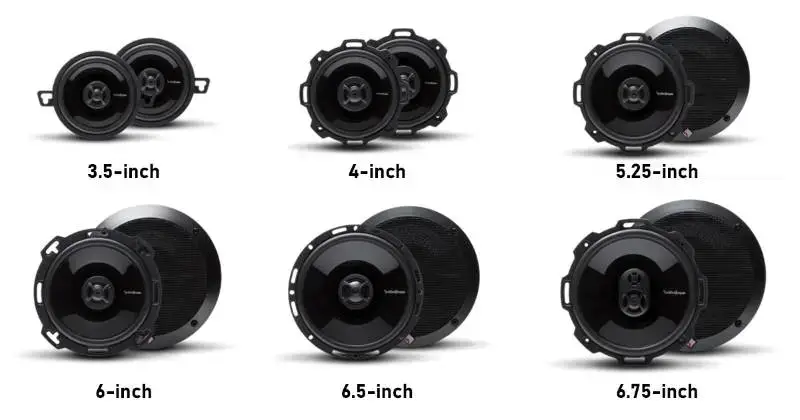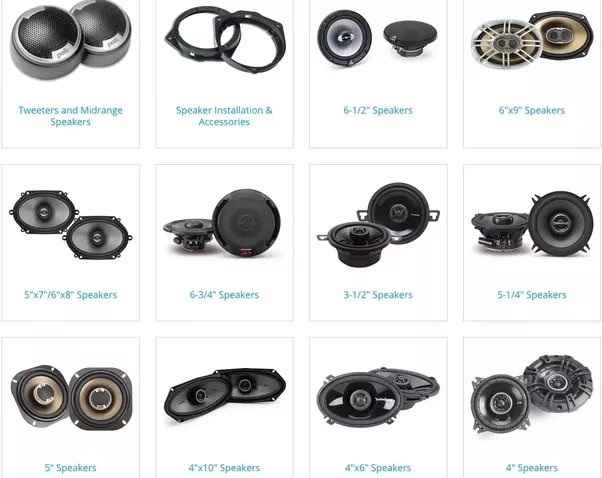When it comes to car audio systems, the speakers are one of the most important components.
They are responsible for turning the electrical signals from your car’s audio system into sound that you can hear. But, not all speakers are created equal.

One of the factors that can affect the performance of a speaker is its size.
In this article, we will take a closer look at the different sizes of car speakers and how they can impact your listening experience.
Understanding Speaker Sizes
The standard sizes for car speakers are 6.5 inches, 5.25 inches, 4 inches, and 6×9 inches. These sizes refer to the diameter of the speaker’s main component, also known as the woofer.
The woofer is responsible for producing the bass and mid-range frequencies.
The 6.5-inch speaker is the most common size and can be found in most vehicles. It offers a good balance between sound quality and volume and is a great choice for those who want to upgrade their car’s audio system without making major changes.
The 5.25-inch speakers are smaller and are often used in vehicles with limited space. They are also a great option for those who want to keep the factory look of their car’s audio system while still improving the sound quality.
The 4-inch speakers are even smaller and are typically found in compact vehicles or as part of a factory-installed audio system.
The 6×9 inch speakers are larger than the others and are typically used in larger vehicles such as SUVs and trucks. They are known for their ability to produce more powerful bass and overall better sound quality. However, they do require more space and may not fit in all vehicles.
It’s important to note that speaker size alone is not the only factor that determines sound quality and volume. Other factors like the power handling capability, frequency response, and sensitivity also play a role.
However, speaker size can be a good starting point when choosing new speakers for your car.
Factors to Consider When Choosing Speaker Size
When choosing a speaker size for your car, there are several factors to consider.
One of the most important factors is the amount of space that is available in your vehicle. If space is limited, then a smaller speaker size may be the best option.
On the other hand, if you have a larger vehicle and want to take advantage of the extra space to improve your listening experience, then a larger speaker size may be a better choice.
It’s also important to consider the compatibility of the speakers with your car’s audio system.
Make sure that the speakers you choose will work with your car’s amplifier and head unit.
Lastly, your personal preference is also a factor to consider. Some people may prefer a more powerful bass, while others may prefer a more balanced sound.
Some people may want more volume, while others may want a more refined sound.
It’s important to consider what you want from your car’s audio system when choosing a speaker size.

How to Measure the Size of Speakers in Your Car
Before upgrading your car’s speakers, it’s important to know the size of the current speakers so that you can choose replacement speakers that are the right size and compatible with your car’s audio system.
Measuring the size of the speakers in your car is a relatively straightforward process.
Measure the diameter of the speaker:
To measure the diameter of the speaker, you will need a ruler or a tape measure.
Carefully measure the distance across the speaker from the outer edge of the speaker frame to the opposite outer edge of the speaker frame.
This measurement will give you the diameter of the speaker.
Measure the depth of the speaker basket:
The depth of the speaker basket is the distance from the back of the speaker frame to the front of the speaker cone.
You will need a ruler or a tape measure to make this measurement. Carefully measure the distance from the back of the speaker frame to the front of the speaker cone.
Note down the measurements and compare it with the standard sizes of car speakers.
It’s important to be as precise as possible when measuring the size of your car’s speakers. If the measurements are not accurate, it can result in buying the wrong size of speakers, which might not fit in your car’s audio system.
Upgrading Your Car’s Speakers
Upgrading your car’s speakers can significantly improve your listening experience.
However, before you decide to upgrade, it’s important to determine if it’s necessary. If your current speakers are working well and producing the sound quality and volume that you want, then upgrading may not be necessary.
However, if you’re not happy with the sound quality or volume of your current speakers, then upgrading may be a good idea.
When choosing replacement speakers, it’s important to consider the size of the speakers, the power handling capability, frequency response, and sensitivity.
Make sure that the speakers you choose will work with your car’s amplifier and head unit.
If you’re not sure what type of speakers to choose, consider consulting with a car audio professional or doing additional research on the different types of speakers available.

Conclusion
In conclusion, the size of the speakers in your car plays a significant role in the overall listening experience.
Understanding the different sizes of car speakers and how they can impact your listening experience is an important step in choosing the right speakers for your car.
By measuring the size of the speakers in your car and considering factors such as space constraints, compatibility with your car’s audio system, and personal preference, you can choose the right size of speakers to upgrade your car’s audio system.
Remember to be precise when measuring the size of your car’s speakers, and don’t hesitate to consult with a car audio professional or do additional research if you’re unsure about what type of speakers to choose.
With the right speakers, you can enjoy a superior listening experience in your car.
What is the difference between a 6.5-inch speaker and a 5.25-inch speaker?
A 6.5-inch speaker has a slightly larger diameter than a 5.25-inch speaker, which means it can handle more power and produce more volume.
The 6.5-inch speaker is also typically better suited for producing bass and mid-range frequencies. The 5.25-inch speaker, on the other hand, is smaller and is often used in vehicles with limited space.
It’s also a great option for those who want to keep the factory look of their car’s audio system while still improving the sound quality.
Can I install larger speakers in my car than the factory-installed speakers?
It depends on the space available in your car and the compatibility with your car’s audio system.
Larger speakers require more space, so you’ll need to ensure that there is enough room in your car to accommodate them.
Additionally, you’ll need to make sure that the larger speakers are compatible with your car’s amplifier and head unit.
Plus, there is a high chance that there won’t be any suitable mounting place for a larger speaker in the slot. So, consult with a professional before proceeding.
How do I know if my car’s speakers need to be upgraded?
If you’re not happy with the sound quality or volume of your current speakers, then upgrading may be a good idea.
However, if your current speakers are working well and producing the sound quality and volume that you want, then upgrading may not be necessary.
Additionally, if you’re experiencing distortion, crackling, or other issues with your car’s speakers, it’s likely that they need to be replaced.
Can I use my home speakers in my car?
It is possible to use home speakers in a car, but it’s important to consider the power handling capability and compatibility with your car’s audio system.
Home speakers are typically designed to work with a home theater receiver, which can provide much more power than a car’s audio system.
Additionally, home speakers are designed to be placed in a room, not in a car, so they may not be able to handle the vibrations and temperature changes that occur in a car.
If you’re considering using home speakers in your car, it’s best to consult with a car audio professional to ensure compatibility and safety.
Can I install a subwoofer in my car without upgrading the speakers?
Yes, it is possible to install a subwoofer in your car without upgrading the speakers.
A subwoofer is a separate component that is designed to produce bass frequencies, and it can be added to a car’s audio system to improve the overall sound quality.
However, it’s important to make sure that the subwoofer is compatible with your car’s amplifier and head unit, and that there is enough space in your car to accommodate the subwoofer.
If you’re unsure about whether a subwoofer will be compatible with your car’s audio system, it’s best to consult with a car audio professional.
